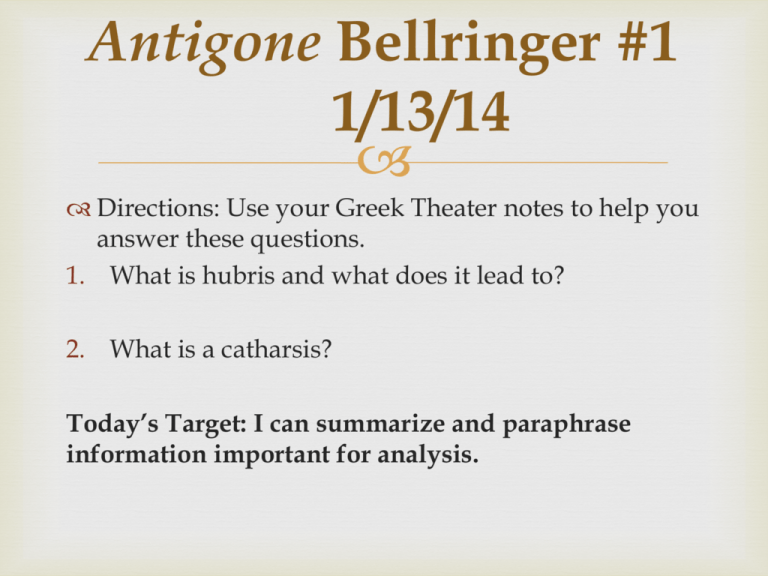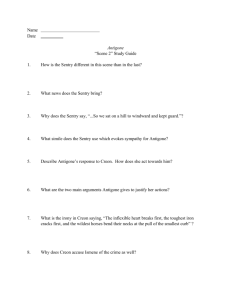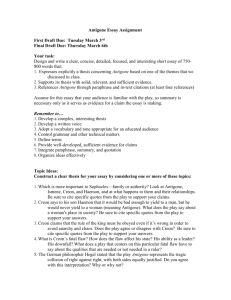Antigone Bellringer #1 1/13/14
advertisement

Antigone Bellringer #1 1/13/14 Directions: Use your Greek Theater notes to help you answer these questions. 1. What is hubris and what does it lead to? 2. What is a catharsis? Today’s Target: I can summarize and paraphrase information important for analysis. Antigone Bellringer #2 1/14/14 Directions: Use your notes on Oedipus and your memory of the Oedipus video/story to answer the following questions. 1. List four facts about Oedipus’ life. 2. Jocasta kills herself after she learns the truth about Oedipus (her husband). Why do you think Oedipus does not commit suicide? Today’s Target: I can summarize and paraphrase information important for analysis. Antigone Bellringer #3 1/15/14 1. 2. Directions: Consider the following values: Loyalty or obligation to family Obedience to civil law Observance of religious law Protection of personal dignity Freedom Protection of community or nation Which value would you say Antigone values most? Why? Which value would you say Ismene values most? Why? Today’s Target: I can summarize and paraphrase information important for analysis. Antigone Bellringer #4 1/16/14 1. How would you describe Creon? What kind of ruler is he? 2. How does the sentry feel about the news he has to tell Creon? Why? Today’s Target: I can read drama and analyze the author’s use of literary conventions. Antigone Bellringer #5 1/27/14 1. What is the conflict between Creon and Antigone in Scene 2 (pages 1036-1038)? 2. Why do you think Ismene now wants to say she was a part of Polyneices’ burial (page 1038)? 3. What argument does Ismene make to Creon to not kill Antigone (page 1039, line 154)? Today’s Target: I can write insightful literary analysis with specific textual evidence. Antigone Bellringer #6 1/29/14 1. What do you think it means to persuade someone using logic? 2. What do you think it means to persuade someone using emotions? 3. What does it mean if someone has credibility? (Use your phone to look this up if you do not know.) Today’s Target: I understand the effectiveness of persuasive techniques. Antigone Bellringer #7 1/31/14 1. What is ethos? 2. What is logos? 3. What is pathos? Today’s Target: I understand the effectiveness of persuasive techniques. Antigone Bellringer #8 2/4/14 Directions: Decide if the follow statements are examples of logos or pathos. 1. Over 75,000 Japanese children have been without clean water for 3 days due to the earthquake and tsumani. 2. A photo of a child with a black eye and torn clothes is in an ad for the Stop Child Abuse American campaign. 3. All the sophomores are skipping school to go to King’s Island. You tell your parents that you will lose friends if you don’t attend too. 4. Studies have shown that drivers who talk on their cell phone are 20% more likely to have an accident. Today’s Target: I understand the effectiveness of persuasive techniques. Antigone Bellringer #9 2/12/14 1. What did Creon decide to do at the end of scene 5? (page 1055) 2. Why do you think Creon, who has been unchangeable the entire play, now changed his mind? 3. Make a prediction: What do you think will happen in the last scene (exodus) of this play ? Today’s Target: I can read drama and analyze the author’s use of literary conventions. Antigone Bellringer #10 2/13/14 Describe the fate of each of the following characters: 1. 2. 3. 4. Antigone Haemon Eurydice Creon Today’s Target: I can read drama and analyze the author’s use of literary conventions.


